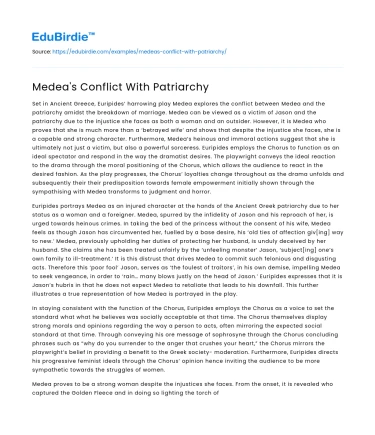Set in Ancient Greece, Euripides’ harrowing play Medea explores the conflict between Medea and the patriarchy amidst the breakdown of marriage. Medea can be viewed as a victim of Jason and the patriarchy due to the injustice she faces as both a woman and an outsider. However, it is Medea who proves that she is much more than a ‘betrayed wife’ and shows that despite the injustice she faces, she is a capable and strong character. Furthermore, Medea’s heinous and immoral actions suggest that she is ultimately not just a victim, but also a powerful sorceress. Euripides employs the Chorus to function as an ideal spectator and respond in the way the dramatist desires. The playwright conveys the ideal reaction to the drama through the moral positioning of the Chorus, which allows the audience to react in the desired fashion. As the play progresses, the Chorus’ loyalties change throughout as the drama unfolds and subsequently their their predisposition towards female empowerment initially shown through the sympathising with Medea transforms to judgment and horror.
Euripides portrays Medea as an injured character at the hands of the Ancient Greek patriarchy due to her status as a woman and a foreigner. Medea, spurred by the infidelity of Jason and his reproach of her, is urged towards heinous crimes. In taking the bed of the princess without the consent of his wife, Medea feels as though Jason has circumvented her, fuelled by a base desire, his ‘old ties of affection giv[ing] way to new.’ Medea, previously upholding her duties of protecting her husband, is unduly deceived by her husband. She claims she has been treated unfairly by the ‘unfeeling monster’ Jason, ‘subject[ing] one’s own family to ill-treatment.’ It is this distrust that drives Medea to commit such felonious and disgusting acts. Therefore this ‘poor fool’ Jason, serves as ‘the foulest of traitors’, in his own demise, impelling Medea to seek vengeance, in order to ‘rain… many blows justly on the head of Jason.’ Euripides expresses that it is Jason’s hubris in that he does not expect Medea to retaliate that leads to his downfall. This further illustrates a true representation of how Medea is portrayed in the play.
Save your time!
We can take care of your essay
- Proper editing and formatting
- Free revision, title page, and bibliography
- Flexible prices and money-back guarantee
In staying consistent with the function of the Chorus, Euripides employs the Chorus as a voice to set the standard what what he believes was socially acceptable at that time. The Chorus themselves display strong morals and opinions regarding the way a person to acts, often mirroring the expected social standard at that time. Through conveying his ore message of sophrosyne through the Chorus concluding phrases such as “why do you surrender to the anger that crushes your heart,” the Chorus mirrors the playwright’s belief in providing a benefit to the Greek society- moderation. Furthermore, Euripides directs his progressive feminist ideals through the Chorus’ opinion hence inviting the audience to be more sympathetic towards the struggles of women.
Medea proves to be a strong woman despite the injustices she faces. From the onset, it is revealed who captured the Golden Fleece and in doing so lighting the torch of Jason’s success, demonstrating her capability as a woman. Euripides depicts her as intelligent and it is this cleverness that leads to her being shunned in a male-dominated society; ‘my reputation yet again! Many times it has been my ruin’. Euripides affirms that Medea’s visceral pain is the window to her identity as the barbarian who will not keep her emotions wrapped up just as expected by the Ancient Greek civilisation. The disconnect of her name and identity further underscores her fragmented sense of place. There is no doubt that Euripides manipulates the audience to view Medea from a sympathetic lens of a woman suffering injustice at the hands of a self centred patriarchal husband. The “is it natural for womenfolk to feel anger against a husband” results in Jason’s ignorance of Medea’s suffering, further delineating his incapacity to feel and connect with his emotions in a meaningful manner.
The fundamental use of the Chorus is Medea is to enunciate the values and beliefs that were present in Greece at that period present the significance of the playwright key message of sophrosyne.






 Stuck on your essay?
Stuck on your essay?

